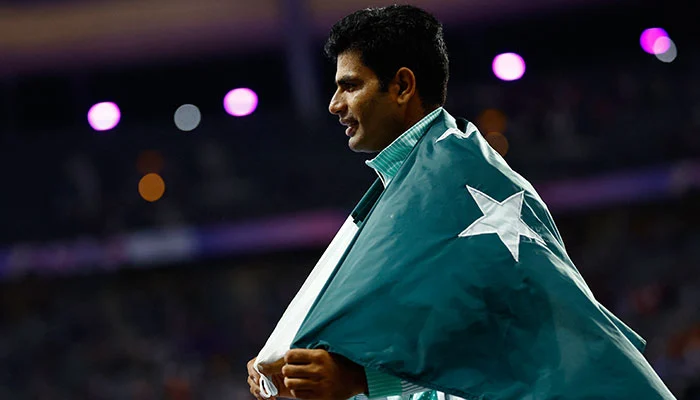In a nation where opportunities are scarce and adversity often crushes dreams, Arshad Nadeem’s Olympic victory carries a message far beyond the mere accolade.
His triumph is a clarion call for the country to dream beyond limitations and believe in the possibility of greatness, no matter how distant it may seem. Nadeem’s success offers a rare moment of collective national pride, reflecting the aspirations of an entire nation through the extraordinary achievement of one individual.
However, the aftermath of this monumental victory revealed a troubling spectacle on social media. A video emerged showing Prime Minister Shehbaz Sharif watching Nadeem’s gold medal win on television. In the video, a party member attributed Nadeem’s success to the PM’s vision, a statement both perplexing and disingenuous.
Nadeem, who achieved this feat through sheer talent and perseverance, was being co-opted by those in power who sought to claim credit for his accomplishment. This moment exposed the vanity and self-importance that often taint the upper echelons of power and highlighted the disconnect between Pakistan’s political leadership and the realities of its people.
This disconnect is symptomatic of a broader issue within Pakistan’s political landscape. Although the PM, like all Pakistanis, was undoubtedly thrilled by Nadeem’s victory, the fact that his subordinates sought to attribute it to his vision reflects a troubling state of leadership.
Instead of serving as custodians of public trust, leaders often become consumed by self-importance, surrounded by sycophants who inflate their egos and obscure their true responsibilities.
This phenomenon is not unique to Pakistan. In many developed nations, leaders wield significant power but remain grounded and accessible, recognizing their role as servants to the public rather than royalty. The contrast is stark: while Pakistani leaders bask in adulation, leaders elsewhere focus on accountability and genuine service.
Nadeem’s achievement serves as a powerful reminder of what can be accomplished through hard work and determination. As a nation, we have much to learn from his example. True greatness lies not in self-promotion but in perseverance, humility, and commitment to one’s goals. The world recognizes authentic greatness without the need for orchestrated praise. It is in the quiet strength of genuine purpose that leaders make their greatest impact.
By celebrating Nadeem’s triumph, perhaps we can begin to shift away from a culture of vanity and embrace a future where leadership is defined by service and authenticity rather than superficial display.










